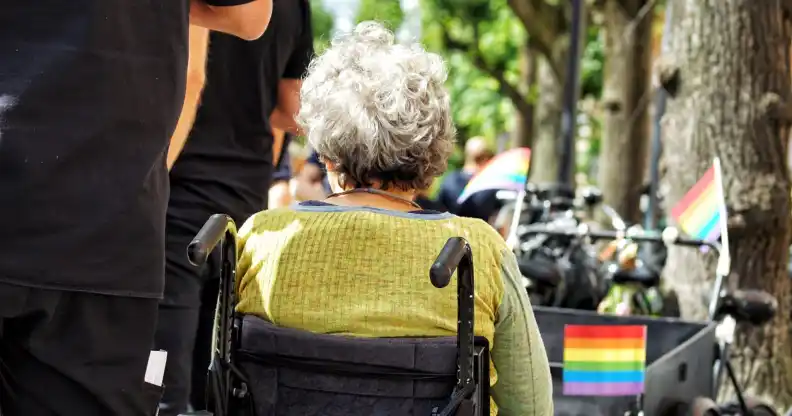As a queer disabled person, I don’t see myself in LGBT+ history. That has to change

LGBT+ disabled people have always existed. (Envato)
The history books should be full of LGBT+ disabled people, but as Shona Louise explains, ableism and accessibility issues have – and are – erasing them.
Honouring and recognising our history as LGBT+ people is so incredibly important. We’ve come so far, and yet still have a long way to go. LGBT+ History Month gives us an opportunity to reflect on the past while using it as motivation to strive for better in the future. But how do you honour and recognise your history when you’re missing from it?
As a queer disabled person, I struggle to see where stories like mine fit in with our history. I know that LGBT+ disabled people have always existed, but it would be easy to think otherwise when our stories have seemingly been erased.
According to Scope, there are 14 million disabled people in the UK, about 20 per cent of the population, and research undertaken in the US suggests that LGBT+ people are more likely to live with a disability. So how come I can count on one hand the number of queer and disabled historical icons I know? People like Frida Kahlo and Marsha P Johnson come to mind, but most of the identifiable names are present LGBT+ disabled people.

Marsha P Johnson had disabilitis. (Netflix)
There is a blank space in our history where disabled people should be present. It is true that more people than ever before feel comfortable identifying as disabled thanks to changing attitudes and perceptions around disability, but even when you take that into account, there are still so many stories missing from our history that represent this intersection.
Accessibility barriers and society’s attitudes have been a key factor in why LGBT+ disabled people have often felt disconnected from the LGBT+ community both in the past and present. So many LGBT+ spaces are physically inaccessible to those with physical disabilities, and loud clubs and bars often shut out autisitc people and those living with conditions like ADHD and sensory conditions. For example, I can think of just two LGBT+ spaces in London that are accessible to me as a wheelchair user (it’s hard to find any basic statistics on accessible LGBT+ venues, a fact which highlights how poorly understood disability is). Our spaces have always been, and still are, fundamentally exclusive. It is our lack of progress in this area that concerns me most. The next generation of LGBT+ disabled people should not feel excluded in the way that my and previous generations have, but if we don’t change things soon then that will be our destiny.

Rosie Jones at the ParalympicsGB Homecoming. (Getty)
I find hope in present day disabled LGBT+ icons for now – people like Rosie Jones, who is unashamedly proud of both her identities and uses humour to educate people. Youtuber Jessica Kellgren-Fozard has also become well known for discussing the intersections of disability and being a part of the LGBT+ community, highlighting where improvements could be made. The rise of social media has given way to a whole new community of queer, disabled activists who are fighting for out voices to be heard.
It took me so long to come out as a young adult, simply because I felt I’d already ticked my diversity box, that I couldn’t be more than one identity. A severe lack of recognisable disabled LGBQ+ people contributed massively to this: if you can’t see yourself within a community then it’s not surprising that you might begin to think that such people don’t exist.
I would like to see a space within LGBT+ History Month to honour and recognise disabled people. If we can begin to see where we have gone wrong in the past, then we might stand a better chance of rectifying those mistakes for the future. We must make it easier and more accessible for disabled people to involve themselves in queer spaces without fear of judgement or discrimination. We need more LGBT+ disabled spaces so that the intersections of our identities can be celebrated, and so no one should ever feel alone.
To me, LGBT+ History Month is an interesting one, because as a disabled person it often feels like I’m still living in history, like not much has changed at all. It’s time our whole community took on the responsibility of changing that.

